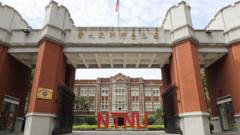Voters in Taiwan have decisively chosen to keep their pro-China lawmakers in a significant recall vote, intensifying political divisions while preserving the current opposition majority in the legislature.
**Taiwan's Political Landscape Remains Unchanged After Controversial Recall Vote**

**Taiwan's Political Landscape Remains Unchanged After Controversial Recall Vote**
Citizens reject 'Great Recall' movement against pro-China politicians, maintaining opposition majority.
In an unprecedented "Great Recall" vote in Taiwan, results indicate that all lawmakers targeted for ousting, largely affiliated with the opposition Kuomintang (KMT), will retain their seats amid soaring political tensions. The vote, held on Saturday across 24 districts dominated by the KMT, showcased a strong 'no' from the electorate, signaling an unexpected continuation of the current legislature's composition.
This recall initiative, driven by the growing civic movement known as the Bluebird movement, was sparked by discontent over KMT lawmakers perceived as too aligned with China. Voter turnout was pivotal for success, necessitating not only a majority in favor of the recall but also a threshold of 25% of registered voters to vacate any seats. Despite the vigorous campaigning from pro-recall groups through social media and public protests, the opposition managed to maintain its slim majority, with final tallies still pending.
As the aftermath of the voting settles, many analysts contend that this failed recall may further polarize Taiwanese society. The opposition sees strengthened power following the vote, which raises concerns that it might lead to less responsive governance in the face of its citizen's growing desires for democratic accountability.
Political unrest has permeated Taiwan as the Bluebird movement gained momentum since early 2024, with protests aimed at the KMT's collaborations and perceived leanings towards Beijing. While the opposition party has denied these allegations, skepticism over their intentions has fueled civic engagement.
Civic actions, including petitions that eventually supported 31 lawmakers' recalls from the KMT, have culminated in heightened political mobilization across Taiwan, illustrating the nation’s deeply engaging struggle over its democratic values and identity.
As Taiwan looks ahead, another recall vote is already set for August, suggesting that the political landscape may yet undergo significant shifts as public sentiment continues to evolve amidst mounting tensions with China and the internal divide over Taiwan's future governance.




















